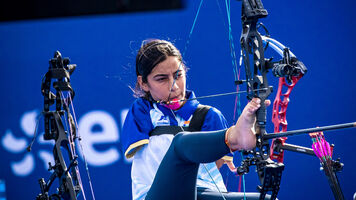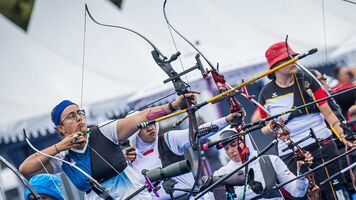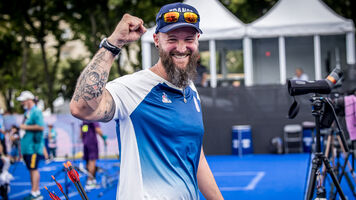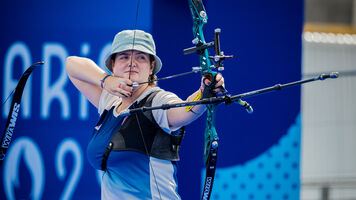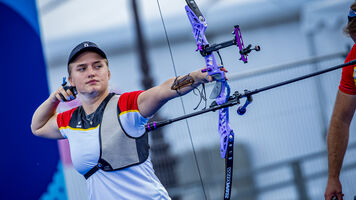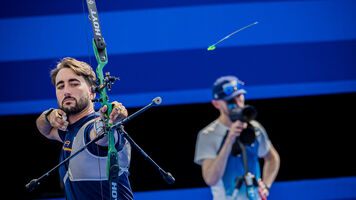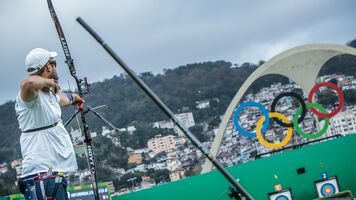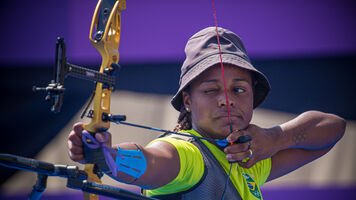Mongolia makes competitive quantum leap with first major medal

Mongolia has a long tradition in archery – and its modern competitive team has been around for more than 50 years, with a federation founded in the 1960s and a first appearance at the Olympics coming on the sport’s return to the Games in 1972.
But in five-plus decades, the country had never taken a medal at a major event.
Not the Olympics, not the Asian Games, and not the world championships.
“I can’t express the feeling,” said Otgonbold Baatarkhuyag, when he changed that earlier this month in Hangzhou. “I’m super excited.”
The now-26-year-old had finished fourth in two events – the men’s team and mixed team – at the Asian Games five years prior in Jakarta.
But this time, for the first time, Mongolia was on the podium. And the recurve men’s title that Baatarkhuyag secured in China wasn’t just his country’s first major medal – but a hugely important win, too.
“I will dedicate all of my life to archery and change the sport in Mongolia,” he said after collecting his medal. “After my career as an athlete, I think I will become a coach and work in archery.”
A rather long-term view in a moment of instant elation, perhaps. But it’s impossible to understate just how much this result will change the perception and priority put on archery in the country.

Mongolia won three gold medals at the Asian Games in 2022, down from the five collected at the prior two editions, in the sports of wrestling (an historically lucrative endeavour for the nation), boxing and archery.
And Otgonbold’s gold medal match was shot in the toughest of circumstances.
He faced the home nation’s Qi Xiangshuo for the title. The support was firmly one-sided.
“I like to shoot when the crowd is loud and cheerful, so it was my style and I like it very much,” he said on the day. “There was no pressure.”
“I just focused on myself, tried to shoot my best, and it worked.”
It’s true, in the sport of archery, that anyone can have a good day. But Otgonbold was great all week. He knocked out multiple Olympic medallist Takaharu Furukawa with a tiebreak-10 in his second match – Furukawa arguably underperformed in Hangzhou – and then found a gear never before seen in his international career.
Otgonbold shot 29s. Lots of 29s. And more often than not, they were good enough to win.
“I was at the top of my game one week before the event. After training, everything was good. I was so excited, we all met at camp and we were ready to go,” he said. “My target here was to win an individual medal.”

Since archery’s debut at the Asian Games in 1978, only eight countries have won gold medals – Mongolia is the eighth.
Korea leads the pack, having collected a phenomenal 46 of the 70 total titles awarded in the history of the multisport event. Japan sits second on eight, followed by India with six and China with four.
Indonesia, Malaysia and Kazakhstan have all climbed multiple podiums but never won gold.
So, why does this win matter? Belief (and funding).
It’s not difficult to see how much easier it is to produce results when a team already knows it’s possible – just look at India’s sweep of the compound podiums after collecting its first three world titles this summer. That squad has had the support and system for a while but severely lacked confidence. Until they didn’t.
Otgonbold has just proven Mongolia’s potential.
And for a nation of just 3,000,000 people – fun fact, the smallest by population to ever win an archery event at the Olympic or Asian Games – but with a passion and facilities to produce elite athletes, getting over the hump is a monumental step. What comes next could be even more signficant.



